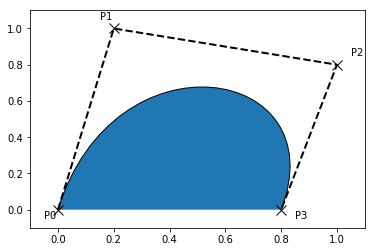matplotlib---5.Path
分类:
Matplotlib
1.matplotlib.patch基本用法
matplotlib.patch对象底层的对象就是Path。它的基本用法如下:
1 2 3 4 5 6 7 8 9 10 11 12 13 14 15 16 17 18 19 20 21 22 23 24 | import matplotlib.pyplot as pltfrom matplotlib.path import Pathimport matplotlib.patches as patchesverts = [(0., 0.), # left, bottom(0., 1.), # left, top(1., 1.), # right, top(1., 0.), # right, bottom(0., 0.), # ignored]codes = [Path.MOVETO,Path.LINETO,Path.LINETO,Path.LINETO,Path.CLOSEPOLY,]path = Path(verts, codes)fig = plt.figure()ax = fig.add_subplot(111)patch = patches.PathPatch(path)ax.add_patch(patch)ax.set_xlim(-2,2)ax.set_ylim(-2,2)plt.show() |

2.matplotlib.path.Path(verts,codes)
PATH对象的创建通过matplotlib.path.Path(verts,codes)创建
参数:
-
verts:PATH的顶点。这些顶点必须构成一个封闭曲线。其中每个顶点必须指定x坐标和y坐标。 -
codes:指示如何使用这些PATH顶点。它与verts关系是一一对应的。有如下指令:Path.STOP:结束path的标记Path.MOVETO:画笔提起并移动到指定的顶点Path.LINETO:画笔画直线,从current position到指定的顶点Path.CURVE3:画笔画二阶贝塞尔曲线,从current position到指定的end point, 其中还有一个参数是指定的control pointPath.CURVE4:画笔画三阶贝塞尔曲线,从current position到指定的end point, 其中还有两个参数是指定的control pointsPath.CLOSEPOLY:指定的point参数被忽略。该指令画一条线段, 从current point到start point
可以通过matplotlib.patches.PathPatch(path)来构建一个PathPatch对象,然后通过Axes.add_patch(patch)向Axes添加PathPatch对象.这样就添加了Path到图表中。
举例:
1 2 3 4 5 6 7 8 9 10 11 12 13 14 15 16 17 18 19 20 21 22 23 24 25 26 27 28 29 30 | import matplotlib.pyplot as pltfrom matplotlib.path import Pathimport matplotlib.patches as patchesverts = [(0., 0.), # P0(0.2, 1.), # P1(1., 0.8), # P2(0.8, 0.), # P3]codes = [Path.MOVETO,Path.CURVE4,Path.CURVE4,Path.CURVE4,]path = Path(verts, codes)fig = plt.figure()ax = fig.add_subplot(111)patch = patches.PathPatch(path)ax.add_patch(patch)xs,ys = zip(*verts)ax.plot(xs,ys,'x--',lw=2,color='black',ms=10)ax.text(-0.05,-0.05,'P0')ax.text(0.15,1.05,'P1')ax.text(1.05,0.85,'P2')ax.text(0.85,-0.05,'P3')ax.set_xlim(-0.1,1.1)ax.set_ylim(-0.1,1.1)plt.show() |

3.在matplotlib中所有简单的patch primitive,如Rectangle、Circle、Polygon等等,都是由简单的Path来实现的。而创建大量的primitive的函数如hist()和bar()(他们创建了大量的Rectanle)可以使用一个compound path来高效地实现。
但是实际上
bar()创建的是一系列的Rectangle,而没有用到compound path,这是由于历史原因,是历史遗留问题。(bar()函数先于Coupound Path出现)
下面是一个Compound Path的例子:
1 2 3 4 5 6 7 8 9 10 11 12 13 14 15 16 | ... verts = np.zeros((nverts, 2)) # nverts为顶点的个数加1(一个终止符)codes = np.ones(nverts, int) * Path.LINETO## 设置 codes :codes分成5个一组,## 每一组以Path.MOVETO开始,后面是3个Path.LINETO,最后是Path.CLOSEPOLY codes[0::5] = Path.MOVETOcodes[4::5] = Path.CLOSEPOLY## 设置顶点 verts ##...## 创建 Path 、PathPatch并添加 ##barpath = Path(verts, codes)patch = patches.PathPatch(barpath, facecolor='green',edgecolor='yellow', alpha=0.5)fig = plt.figure()ax = fig.add_subplot(111)ax.add_patch(patch)ax.show() |
在创建Axes或者SubPlot时,可以给构造函数提供一个axisbg参数来指定背景色



【推荐】国内首个AI IDE,深度理解中文开发场景,立即下载体验Trae
【推荐】编程新体验,更懂你的AI,立即体验豆包MarsCode编程助手
【推荐】抖音旗下AI助手豆包,你的智能百科全书,全免费不限次数
【推荐】轻量又高性能的 SSH 工具 IShell:AI 加持,快人一步
· go语言实现终端里的倒计时
· 如何编写易于单元测试的代码
· 10年+ .NET Coder 心语,封装的思维:从隐藏、稳定开始理解其本质意义
· .NET Core 中如何实现缓存的预热?
· 从 HTTP 原因短语缺失研究 HTTP/2 和 HTTP/3 的设计差异
· 分享一个免费、快速、无限量使用的满血 DeepSeek R1 模型,支持深度思考和联网搜索!
· 使用C#创建一个MCP客户端
· ollama系列1:轻松3步本地部署deepseek,普通电脑可用
· 基于 Docker 搭建 FRP 内网穿透开源项目(很简单哒)
· 按钮权限的设计及实现